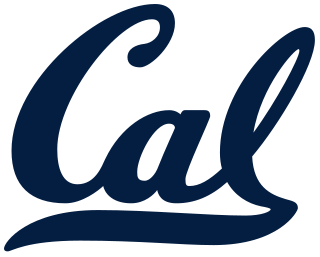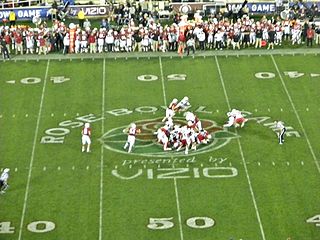Related Research Articles

College football is gridiron football consisting of American football played by teams of student athletes fielded by American universities, colleges, and military academies, or Canadian football played by teams of student athletes fielded by Canadian universities. It was through college football play that American football rules first gained popularity in the United States.

Glenn Scobey Warner, most commonly known as Pop Warner, was an American college football coach at various institutions who is responsible for several key aspects of the modern game. Included among his innovations are the single and double wing formations, the three point stance and the body blocking technique. Fellow pioneer coach Amos Alonzo Stagg called Warner "one of the excellent creators". He was inducted as a coach into the College Football Hall of Fame as part of its inaugural class in 1951. He also contributed to a junior football program which became known as Pop Warner Little Scholars, a popular youth American football organization.

Tobin Bo Gunnar Gerhart is a former American football running back. He was selected by the Minnesota Vikings in the second round of the 2010 NFL Draft. He played college football for Stanford University, and was a unanimous All-American. In 2009 Gerhart won the Doak Walker Award and was the runner-up for the 2009 Heisman Trophy. He received 1,276 points in the Heisman voting, coming in second to Mark Ingram Jr., who received 1,304 points; the 28-point margin was the closest vote in Heisman history. Gerhart had a breakout senior season in 2009, leading all running backs in the nation in rushing yards, touchdowns, and points scored, and setting several Pac-10 and school records. He held the Stanford record for most rushing yards in a season (1,871) until Christian McCaffrey broke it in 2015, and still holds Cardinal records for touchdowns in a season (28) and most touchdowns in a career (44).
Bobby Grayson was an American football player. He was a two-time consensus All-American player who led the Stanford University football team to three consecutive Rose Bowl Games from 1933 to 1935.

The California Golden Bears football program represents the University of California, Berkeley, in college football as a member of the Pac-12 Conference at the NCAA Division I FBS level. The team plays its home games at California Memorial Stadium and is coached by Justin Wilcox. Since beginning of play in 1886, the team has won five NCAA recognized national titles - 1920, 1921, 1922, 1923, and 1937 and 14 conference championships, the last one in 2006. It has also produced what are considered to be two of the oddest and most memorable plays in college football: Roy "Wrong Way" Riegels' fumble recovery at the 1929 Rose Bowl and The Play kickoff return in the 1982 Big Game.

The Stanford Cardinal football program represents Stanford University in college football at the NCAA Division I FBS level and is a member of the Pac-12 Conference's North Division. The team is known as the Cardinal, adopted prior to the 1982 season. Stanford was known as the "Cardinal" for its first two decades of athletic competition, then more commonly as the "Cardinals" until 1930. The name was changed to the "Indians" from 1930 to January 1972, and back to the "Cardinals" from 1972 through 1981. A student vote in December 1975 to change the nickname to "Robber Barons" was not approved by administrators.
The 1926 college football season was the first in which an attempt was made to recognize a national champion after the season.
The 1934 Rose Bowl, played on January 1, 1934, was an American football bowl game. It was the 20th Rose Bowl Game. The Columbia Lions defeated the Stanford Indians 7-0. Cliff Montgomery, the Columbia quarterback, was named the Rose Bowl Player Of The Game when the award was created in 1953 and selections were made retroactively. At 35,000, it has the lowest attendance in the Rose Bowl game since the Rose Bowl Stadium was built in 1922. This was one of the few rainy New Year's Day celebrations in Pasadena, California. Rain three days before had turned the Rose Bowl stadium into a small lake.
A national championship in the highest level of college football in the United States, currently the NCAA Division I Football Bowl Subdivision (FBS), is a designation awarded annually by various organizations to their selection of the best college football team. Division I FBS football is the only National Collegiate Athletic Association (NCAA) sport for which the NCAA does not sanction a yearly championship event. As such, it is sometimes unofficially referred to as a "mythical national championship".
The 1972 Rose Bowl was the 58th edition of the college football bowl game, played at the Rose Bowl in Pasadena, California, on Saturday, January 1. The Stanford Indians of the Pacific-8 Conference upset the undefeated and fourth-ranked Michigan Wolverines of the Big Ten Conference by a point, 13–12, repeating as Rose Bowl champions. The Player of the Game was Stanford quarterback Don Bunce.
The 1940 Stanford Indians football team, nicknamed the "Wow Boys", represented Stanford University during the 1940 college football season. First-year head coach Clark Shaughnessy inherited a team that finished with a 1–7–1 record the previous season. He installed his own version of the T formation, a system that had largely fallen into disuse since the 1890s and was viewed as obsolete. The Indians shocked observers when they won all ten of their games including the Rose Bowl, which prompted several selectors to declare them the 1940 national champions. Stanford's dramatic reversal of fortunes prompted football programs across the nation to abandon the single-wing formation in favor of the new T formation.
The 1941 Stanford Indians football team represented Stanford University during the 1941 college football season. Second-year head coach Clark Shaughnessy led the team to a 6–3 record. Before the season, Stanford, which the year prior had finished 10–0, was considered a favorite for the national championship, but three conference losses put it out of contention for a return to the Rose Bowl. After the season, Shaughnessy left Stanford to take over as head coach at the University of Maryland.

The Pac-12 Football Championship Game is an annual college football game held by the Pac-12 Conference to determine the season's conference champion. The game pits the champion of the North Division against the champion of the South Division. The inaugural game was held during the 2011 season.
The 1958 Stanford Indians football team represented Stanford University in the 1958 NCAA University Division football season. In head coach Jack Curtice's first season at Stanford, the Indians won only two games, ending the season with a 2–8 record, the school's worst since a winless 1947 season. Home games were played on campus at Stanford Stadium in Stanford, California.

The Stanford rugby teams of 1906 to 1917 represented Stanford University as the school's only football program during those years, replacing American football with rugby union. The school had played American football from 1892 to 1905, but in 1906, concerned with the growing levels of violence in football, Stanford and other universities changed to rugby. Stanford played twelve seasons of rugby, during which it played other college teams, club teams from the United States, Canada, and Australia, as well as the New Zealand national team and Australia national team. Despite the team's success, it became clear that other schools were not adopting rugby in large numbers, and after rival California returned to football in 1915, Stanford faced a limited number of potential opponents; and after a year of playing neither sport officially due to World War I, the school returned to American football in 1919.

The 2013 Rose Bowl, the 99th edition of the annual game, was a college football bowl game played on Tuesday, January 1, 2013, at the same-named stadium in Pasadena, California. The Pasadena Tournament of Roses Association is the organizer of the game. The game matched Big Ten Conference Champions Wisconsin Badgers against the Pac-12 Conference Champions Stanford Cardinal, a rematch of the same two teams in the 2000 Rose Bowl. The Cardinal defeated the Badgers 20–14 for the Rose Bowl Championship. This was Wisconsin's third consecutive Rose Bowl defeat.

Jonathan Bryce Love is an American football running back for the Washington Football Team of the National Football League (NFL). He played college football at Stanford and was drafted by Washington, then known as the Redskins, in the fourth round of the 2019 NFL Draft. In his youth, he was also a sprinter specializing in the 200 meters and 400 meters, earning USA Track & Field Youth Athlete of the Year honors in 2009.
The 1926 Haskell Indians football team was an American football that represented the Haskell Institute as an independent during the 1926 college football season. With players from 18 different tribes, the team compiled a 12–0–1 record and outscored opponents by a total of 558 to 64. The team's 558 points was the most scored by any college football team in many years.
The 1939 Dartmouth Indians football team represented Dartmouth College in the 1939 college football season. The Indians were led by sixth-year head coach Earl Blaik and played their home games at Memorial Field in Hanover, New Hampshire. They finished with a record of 5–3–1 and outscored opponents by a total of 154 to 73. After amassing a 5–0–1 record to start the season and shutting out four of those opponents, Dartmouth ascended to 14th in the AP Poll, but lost their last three contests against, No. 4 Cornell, Princeton, and a Stanford team that finished 1–7–1—their only win coming against Dartmouth. Indians finish the year unranked.
References
- ↑ "Stanford Game-by-Game Results; 1936–1940". College Football Data Warehouse. Archived from the original on 2012-03-02. Retrieved September 9, 2011.
- ↑ "Columbia will play Stanford in Gotham tilt". Schenectady Gazette. November 28, 1936. Retrieved October 14, 2014.